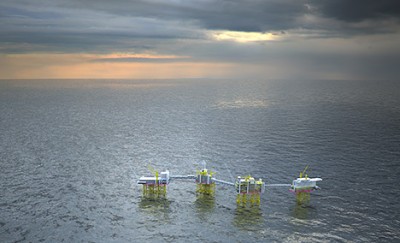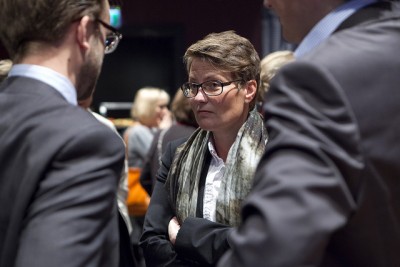NEWS ANALYSIS: Environmental groups were pleasantly surprised when Norway’s new conservative government unveiled some new climate-friendly goals earlier this month, including full electrification of new offshore oil fields. The government is already facing strong objections from state-owned oil company Statoil, but this week’s release of the UN’s latest climate report shows that such measures are now urgently needed to cut Norway’s own carbon emissions.

The alternative, according to Nina Jensen, leader of the World Wide Fund for Nature Norge (WWF), will be the “painful, difficult and extremely costly” effects of climate change. Jensen called the UN’s new report “very tough,” and told Norwegian Broadcasting (NRK) that it shows “no one will get away” from the ill effects of climate change.
She and other environmental advocates are worried that the government, despite its oil field electrification goals and other climate-friendly plans, will backtrack under pressure from Norway’s powerful oil and gas industry. Offshore oil and gas production has made Norway wealthy and, some argue, economically dependent on the offshore industry. The last left-center government has been criticized for failing to make much progress on the emissions cuts than can help reverse climate change, even though it had a much higher environmental profile than the current government led by the Conservatives and even more conservative Progress Party.

The new government “now must act immediately,” Jensen told NRK. “The UN report shows that climate change isn’t something that’s coming in the future,” she said. “It’s happening here and now and we must act. We simply can’t wait.”
Jensen is the sister of Norway’s new finance minister, Siv Jensen of the Progress Party, which has questioned climate change over the years. Even Nina Jensen was pleased by her sister’s support in mid-March of the oil field electrification plans and other plans to invest more of Norway’s giant sovereign wealth fund known as the “Oil Fund” in renewable energy projects and sustainable companies and projects in developing countries. “Norway must cut emissions here at home, but we must also play a role outside our own borders,” said Prime Minister Erna Solberg.
It didn’t take long, though, for Statoil to threaten that demands for full electrification of its oil fields in the Utsira area off the west coast of Rogaland (now called Johan Sverdrup, Ivar Aasen, Gina Krog and Edvard Grieg after historic figures in Norway) would lead to delays and billions of kroner in costs. Statoil had unveiled its own plans to partially electrify Utsira’s fields, but that didn’t satisfy either environmentalists or many politicians in Parliament.
Now environmental leaders like Lars Haltbrekken of Norges Naturvernforbund (Friends of the Earth in Norway), Rasmus Hansson, a Member of Parliament for the Greens Party (Miljøpartiet De Grønne) and Janne Stene of Bellona are disappointed the government isn’t quickly getting more aggressive and coming up with more concrete measures to cut emissions. They agree with Nina Jensen that the efforts of world leaders as well “haven’t met the size of the problem.”

Norway’s new minister for climate and environmental issues, Tine Sundtoft of the Conservatives (Høyre), officially took receipt of the new UN report on climate change Monday and said she would try to avoid its warnings of crisis by continuing to improve Norway’s train lines to get more cars and trucks off the road, supporting more public transportation projects, phasing out oil-fueled heating in Norway, helping local governments become more climate friendly and creating a “green tax commission” that would have a goal of making it “more expensive to pollute and less expensive to make environmentally friendly choices.”
Jensen and most of her environmental colleagues wanted more concrete measures from Sundtoft to cut Norway’s emissions. Meanwhile, Sundtoft’s colleague, Oil and Energy Minister Tord Lien, still supports oil and gas exploration in the Arctic while the state Norwegian Environment Agency (Miljødirektoratet) wants to halt all drilling in the Barents Sea. Lien also formally opened a new oil research center at the University of Stavanger last week, which aims to help exploit even more oil resources from the Norwegian Continental shelf.
All talk, no action
This why those seriously worried about the floods, famines, destructive storms and other calamities linked to climate change question the Norwegian government’s commitment to reverse it. There’s been a lot of talk and little action over the years, they argue.
Meanwhile, the Jensen sisters may move from years of family quarrels over climate issues to more hugs like those seen earlier this month when the government goals were announced. Statoil executives, moreover, may need to follow the wishes of representatives for their largest shareholders. All the anti-emission measures that may be forced on individuals in Norway won’t come close, experts warn, to having the same effect as a firm clampdown on emissions by the oil industry.
newsinenglish.no/Nina Berglund

